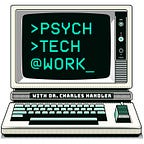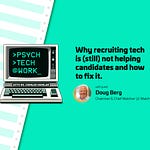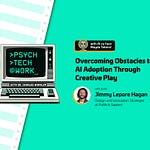"The real challenge isn't just defining skills, but creating a system where hiring criteria and performance criteria align—where your hiring approach is integrated into your company’s everyday operations."
—Matthias Schmeisser
Summary:
In this episode of "Psych Tech @ Work," I am joined by Matthias Schmeisser, a talent acquisition leader from Berlin Germany who is passionate about skills based hiring.
Much of our conversation is focused on sharing Matthias’ experience on the path to transforming his company's talent acquisition approach by implementing a skill-based system that ensures alignment between hiring and performance criteria.
Matthias highlights the importance of creating a skill-led organization, where every role is assessed and hired based on well-defined skills rather than previous experience or degrees.
This episode is a must listen for anyone who is interested in executing a skills based hiring process in their organization.
Topics Covered:
Skills-Based Hiring:
Moving away from resumes and focusing on validated, functional, and core skills.
Designing a skill-based career framework that integrates hiring and performance management
Bias Reduction in Hiring:
The pitfalls of "pedigree recruiting" and years of experience as a performance proxy.
How skill-based hiring helps reduce bias and increases the quality of talent.
The Role of Technology:
Leveraging tech tools to assess both functional and social skills while enhancing decision-making.
Using interview intelligence tools to improve interviewer training and ensure consistency in the assessment process.
Takeaways:
Replace Resumes with Skills: Resumes introduce bias into the hiring process. Focus on specific, validated skills to make more objective hiring decisions.
Align Hiring and Performance Criteria: Create a consistent framework where the skills used in hiring are the same as those used to assess performance, ensuring seamless integration across the employee lifecycle.
Use Technology Thoughtfully: Tools like interview intelligence and skill assessments can help make the hiring process more efficient and less biased while providing meaningful data to inform decision-making.
Start Small: Implement skills-based hiring on a smaller scale before scaling up. Prove the model works by piloting it with key roles and using the results to drive broader adoption.
Articles Discussed in the "Take it or Leave it" Segment:
Matthias and I review two articles about tech and skills based hiring and share our takes.
Article 1: Problems with “Botshit”- what does this mean for recruiting?
Summary: This article from Business Insider explores the frustrations caused by AI chatbots in customer service. Matthias and Charles discuss the limitations of bots in replicating human interaction and the importance of maintaining quality control when using AI in customer-facing roles.
Article 2: The realities of connecting skills based hiring and education- new infrastructure is needed
Summary: A Forbes article discussing the disconnect between the education system and the workplace, particularly regarding how skills-based hiring may render traditional degrees less relevant. Matthias and Charles debate the need for both higher education and skills verification, particularly in highly specialized fields like medicine.











